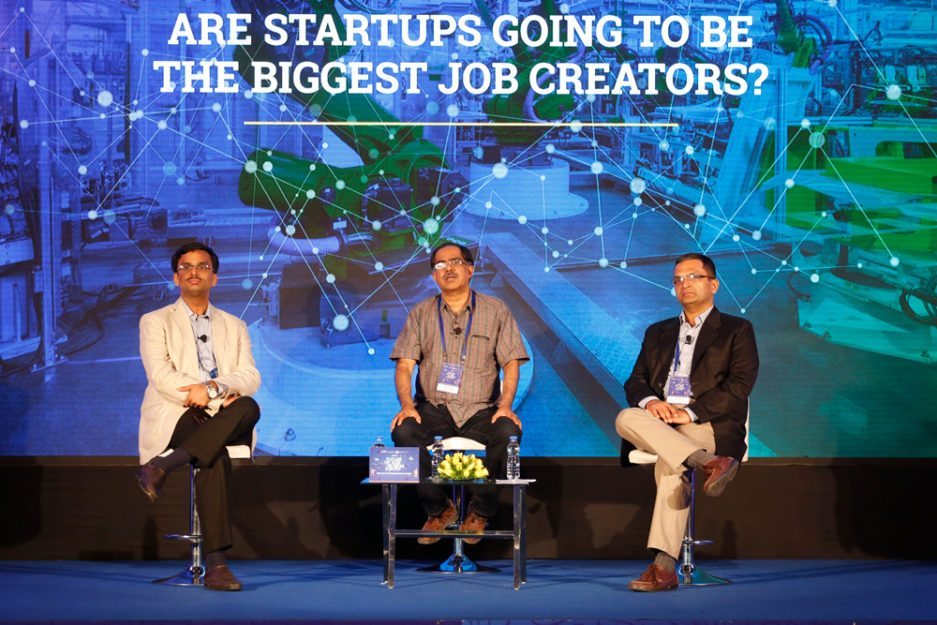Not so long ago, startup founders in India used to tell tales of how their families and friends would baulk at the idea of them leaving a “secure”, well-paying corporate job to start something of their own. Today, the tide has turned completely. Building a startup is no longer considered foolhardy. To the contrary, it is pretty much a badge of honour.
Over the past few years, startups have emerged as one the biggest job creators in the country. But, with the advent of technologies like robotics and artificial intelligence (AI), will they continue to generate jobs in the country at the current speed? This is the question that Sharad Sharma, co-founder of think tank iSpirt, and Anshuman Das and Rishi Das, co-founders of talent acquisition solutions company CareerNet, tried to answer in the session ‘Are Startups going to be The Biggest Job Creators?’ at the FactorDaily-Careernet Future of Jobs in India Summit held in Bangalore on November 21.
The jobs defining the startups of today are the ones on the periphery. So, organisations are going to become much leaner, and as they get leaner, they will become flatter
—Anshuman Das, co-founder, Careernet
Sharad Sharma feels that startups will continue to create jobs in substantial numbers in future. He said: “The nature of the structure of the industry, which jobs are inherently linked with, is going to change.”
He added, however, that the pecking order of jobs would change dramatically. “In this new order of pecking that we are talking about, the salaries of people who’re doing low-end, repetitive jobs are going to be capped. They’ll be capped at about $8 per hour because there are robots that can do the work at $8 per hour and this figure is predicted to come down to $4-5 per hour in the next five-seven years,” said Sharad. Essentially, the class of jobs that are vulnerable to robotics are the dead-end jobs.

The jobs that require a human touch will continue to remain important — for instance, people will still need to go to doctors. But, the most important jobs will be the ones where people are going to be toolmakers because the fourth industrial revolution that we are seeing is making everybody a producer. “We are going through the ‘Cambrian explosion’ of toolmakers. Keeping view of this, we need to embrace the democratisation of technology, implying that anyone, anywhere — from a domain expert to a lay person from a rural area — can become a maker or a toolmaker,” said Sharma.
“We need to embrace the democratisation of technology, implying that anyone, anywhere can become a maker or a toolmaker”
— Sharad Sharma, co-founder, iSpirt
So, what the 2025 unicorn going to look like? “The jobs defining the startups of today are the ones on the periphery. So, organisations are going to become much leaner, and as they get leaner, they will become flatter. This would mean that hierarchy will go away; which is happening in any way. I believe hierarchy will probably be established in the freelancer,” said Anshuman Das, co-founder, CareerNet Group, on the future of startups from the talent point of view.
These jobs that lie on and outside the periphery are driven by the freelance economy. They are very skilled and are outcome driven, so education may not be a differentiator for people to these jobs, added Das. What this probably means is that the education system itself will get disrupted. The new order that comes up then will value people who have tremendous potential to adapt themselves in any environment. These people will be more ‘generalists’ than ‘specialists’.
Subscribe to FactorDaily
Our daily brief keeps thousands of readers ahead of the curve. More signals, less noise.
To get more stories like this on email, click here and subscribe to our daily brief.
Lead visual: Nikhil Raj Careernet is the sponsor of our Future of Jobs in India coverage and events. The coverage and the content of the event are editorially independent. For more on how we separate our newsroom and our business functions, read our code of conduct here.








